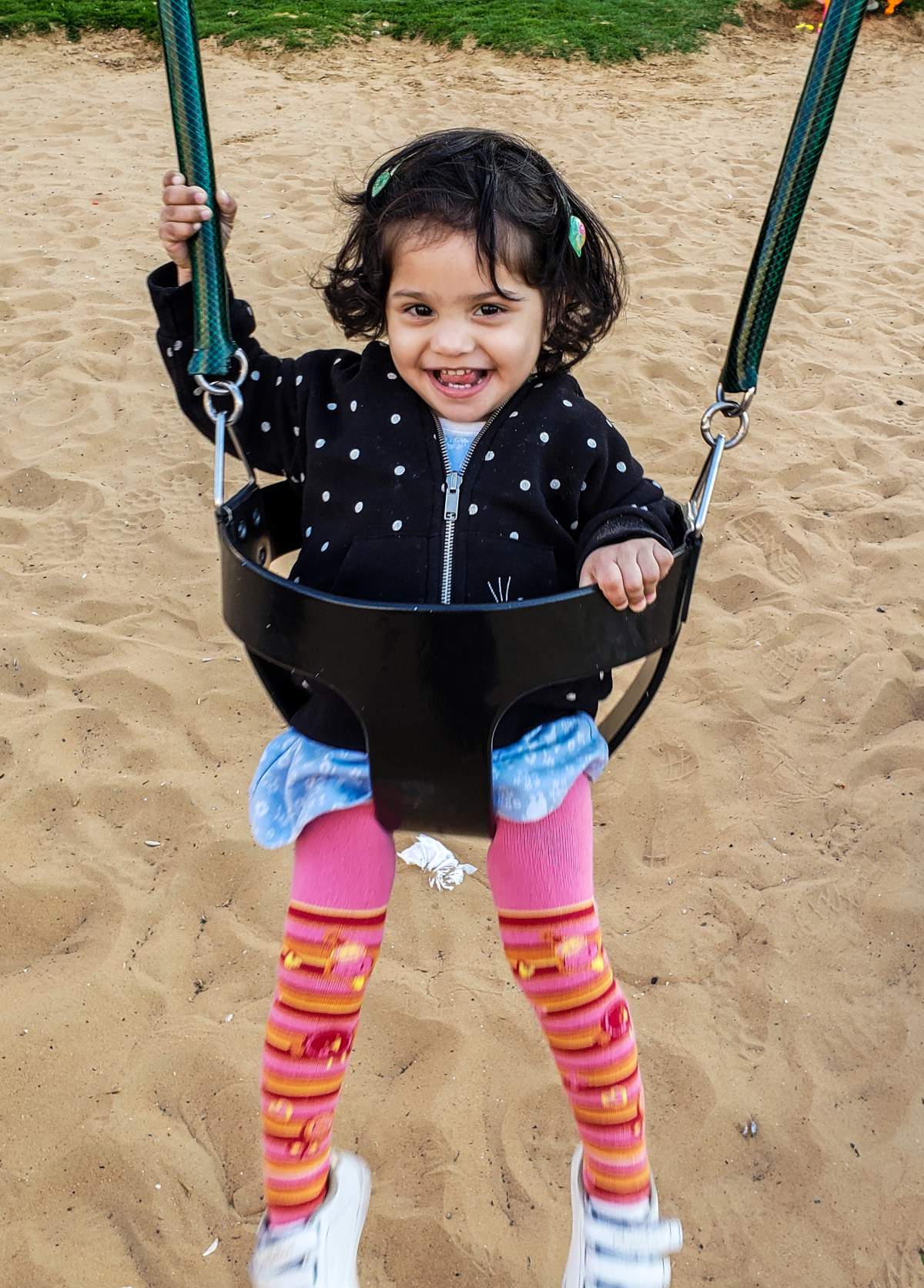Ayat Ahmed is a healthy toddler, just two months shy of her second birthday and learning her ABC’s with her mother in a small Dubai apartment.

But it hasn’t always been this way. Born premature and battling pneumonia, she weighed only six and a half pounds at three months old when her Canadian adoptive parents, Tauseef Qureshi and Ameera Hanif, travelled to Pakistan to become her legal guardians.
Now, 18 months later, the couple is fighting to bring Ayat home, challenging a Canadian ban on adoptions from Pakistan, while also struggling against Qureshi’s recent cancer diagnosis.
“We stand a family divided on two separate continents, living apart, not knowing when we will have the chance to see each other,” Qureshi said from his south Ottawa home.
Ottawa family struggling with infertility tries to adopt from Pakistan

The past year has been marked by periods of extreme loneliness and desperation for the Ottawa couple, causing them to feel like collateral damage in an ongoing dispute between Canada and Pakistan that’s left officials from both countries arguing over the meaning of the word “adoption” and what it is to be a parent.
“The joy of knowing that we would have someone as our daughter in our life with us was a huge high,” Qureshi said. “When immigration turned us down — twice now — it was heartbreaking.”
‘Illegal removal’ of children may have prompted 2013 ban
Canada banned adoptions from Pakistan in July 2013, saying there were “incompatibilities” between the two countries’ legal systems that prevented parents from finalizing adoptions in Canada.
LISTEN: Brian Hill joins the 630 CHED Afternoon News
At the time, the ban surprised families trying to adopt from Pakistan. It was also unclear why Canada suddenly had issues with Pakistani adoption policies that had not changed in decades.
But a 2011 letter from Pakistan’s High Commission in Ottawa sent to Canada’s Department of Foreign Affairs, and provided exclusively to Global News by a government source, sheds new light on why the ban may have been put in place.
According to the letter, Pakistan warned Canada that “abandoned and destitute children” were being taken to developed countries, including Canada, from Pakistan under the guise of adoption, which Pakistan said was “tantamount to smuggling of children under the cover law.”

The letter called on Canada to halt the “illegal removal” of children from Pakistan, while requesting that the two governments strike a deal to “regulate” custody of adopted children.

Get breaking National news
According to the source who provided the letter, the ban on adoptions that followed was, at least in part, the result of failed efforts by the provinces, the federal government and Pakistan to align the two countries’ adoption policies.
Then, in October 2018, the current federal government said it would speak with Pakistan about normalizing the countries’ adoption rules. But according to a spokesperson for Immigration, Refugees and Citizenship Canada (IRCC), Pakistan’s response in May reinforced existing beliefs about differences between the two systems.
“Pakistani authorities confirmed that Pakistan does not recognize adoption as understood in Canadian law and in international treaties,” said IRCC spokesperson Rémi Larivière in a written statement.
WATCH: Ontario couple forced to return daughter to Nigerian orphanage

Pakistan, meanwhile, says Canada has it wrong when it comes to its adoption rules. The country also says the ban sets Canada apart from international allies — such as the United States, Australia and the U.K. — which continue to process adoptions from Pakistan.
“The concept of ‘adoption’ as legally understood in Canada is covered by the ‘Guardians and Wards Act 1890’ in Pakistan,” said Nadeem Kiani, a spokesperson for Pakistan’s High Commission in Ottawa in a written statement.
“A foreigner couple, particularly a Muslim couple, may take in a child from an orphanage, or even a ‘spare’ child from a large family, and then later, they may adopt that child in their country according to the applicable laws,” he said.
WATCH: Limited international adoption opportunities for Quebec

Asked about the 2011 letter, Kiani reiterated his position that adoptions are legal in Pakistan, adding that the purpose of the letter was to seek a formal agreement regulating adoptions between the two countries.
“On the face of it, it seems that these are mere excuses to discriminate against parents who want to adopt a child from Pakistan,” he said.
A spokesperson for the federal Conservatives said that when the ban was implemented, the Canadian government was clear that Pakistan’s adoption policies violated international law — something the current government agrees with.
Why ban adoptions from Pakistan?
Canada banned Pakistani adoptions because Pakistan has not signed the United Nations’ Hague Convention, an agreement governing adoptions worldwide, and because Pakistani law does not formalize adoptions in the same way as either Canadian or international law.
However, documents released to the CBC show that at the time the ban was implemented, Canadian officials believed Sharia law and the Islamic tradition of “kafala” — practised in Pakistan and other predominantly Muslim countries around the world — do not align with international adoption standards because they fail to extinguish the rights of birth parents after guardianship is transferred, even in cases involving orphans.
But Pakistan says this interpretation of kafala is inaccurate. In fact, Kiani argues the UN Convention on the Rights of the Child, which both countries have signed, specifically recognizes kafala and ensures a child’s religious, ethnic and cultural background is protected during the adoption process.
“The position of the Immigration Department of Canada to refer to Sharia Law to deny adoption of children from Pakistan is a denial tactic,” Kiani said. “Pakistan’s laws do not forbid adoption.”
Still, according to IRCC, Pakistani law does not allow children to be formally adopted because guardians are not granted full parental rights.
“We understand and sympathize with any prospective parents who have experienced hardships while trying to adopt children from Pakistan. However, IRCC must respect its obligations under international and Canadian law,” Larivière said.
“As such, for cases received after the suspension (in 2013), IRCC still cannot approve immigration or citizenship applications.”
Family not trying to ‘usurp’ the law
Qureshi and Hanif understand Canada has a responsibility to protect children. But they believe the individual factors of their case must be considered separately from the blanket ban on adoptions imposed on Pakistan.
They have argued that the government should grant Ayat entry to Canada based on humanitarian grounds because her future in a Pakistani orphanage would almost certainly mean serious hardship.
“We want to do everything legally. We’re not trying to usurp the system,” Qureshi said.
It’s an argument the family’s immigration lawyer, Adrienne Smith, agrees with.
“What’s happened in this case, sadly, is that we have an officer, a decision-maker at the embassy, who hasn’t taken a proper look at the file,” Smith said.
WATCH: Ottawa family struggles with cancer diagnosis while trying to adopt from Pakistan

After an immigration officer made a mistake when denying the family’s application for the first time, lawyers for IRCC agreed to reconsider the case. But eight months later, their application was denied for a second time, with IRCC deciding Ayat’s best interests when applying to live in Canada did not outweigh the fact that Pakistan has not signed the UN Hague Convention.
This, Smith said, misses the point of the humanitarian request altogether. Denying Ayat entry to Canada because Pakistan has not signed a UN convention fails to address what is in Ayat’s best interest, she said.
Provinces debate lifting ban
In Canada, there is a patchwork of provincial and territorial laws governing adoption. And while IRCC has final say on who’s allowed to enter Canada, it’s the provinces that decide whether an adoption goes forward. But the provinces stopped doing this for Pakistani children in 2013.
So when the government heard back from Pakistan in May, it forwarded their response to the provinces and territories, giving them until September to decide if they intend to lift their individual bans or keep the moratorium in place.
WATCH: B.C. family overjoyed after returning from Japan with adopted child

IRCC declined to speculate on what might happen if some provinces decide to lift their bans and others do not, adding that it would consider the provinces and territories’ positions carefully before making any decisions.
British Columbia, meanwhile, said that from its perspective, the ban on Pakistani adoptions cannot be reversed unless all provinces agree to lift their suspensions and IRCC starts issuing residency and citizenship visas again.
For Hanif, who’s battled infertility for more than a decade, suffered the devastating effects of a miscarriage, and now fears she might never see her husband alive again, September seems like a lifetime away.
- Toronto Stock Exchange plunges due to massive precious metals sell-off
- Bombardier warns of ‘significant impact’ to travellers from Trump’s threat
- Can Trump decertify aircraft? What experts say amid Bombardier threat
- Stepfather of two missing N.S. kids charged with sexual assault of adult, forcible confinement
“When my husband was diagnosed with cancer, it was impossible for me to live without him,” she said. “But I had to make a tough decision between choosing him or her. What should I do?
“I used to cry every night, living in fear that if I wake up in the morning, I don’t know if my husband will have survived,” she said. “What if I lose him? What if something happens to him?”
The couple is pleading with the Canadian government to reconsider their application. They are also hopeful that no matter what the outcome of their case, Qureshi’s health will improve and they will be reunited soon.
“I will give up Canada before I give up her,” Qureshi said.
Contact: brian.hill@globalnews.ca

_848x480_1583716419945.jpg?w=1040&quality=70&strip=all)







Comments